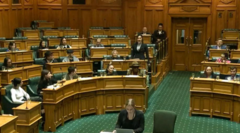In a bold move, New Zealand’s parliament has voted against the Treaty Principles Bill, aiming to redefine the 1840 Treaty of Waitangi, with a staggering 112 to 11 vote. This decision comes in the wake of significant public outcry, exemplified by a protest that rallied over 40,000 people outside parliament last year. The bill, introduced by the right-wing Act Party, was aimed at providing legal clarity on the Treaty principles that recognize the rights of both Māori and non-Māori. However, it was almost universally disapproved across major political parties.
New Zealand Votes Down Controversial Treaty Principles Bill Amidst Protests

New Zealand Votes Down Controversial Treaty Principles Bill Amidst Protests
New Zealand lawmakers have decisively rejected a controversial bill aimed at redefining Treaty principles, following significant public outrage.
The bill's failure was anticipated as a parliamentary committee recommended against its progression shortly before the second reading. Act Party's sole support for the bill came from its members, led by David Seymour, who still vows to campaign for some form of its principles to eventually be legislated. During the contentious debates, Labour leader Chris Hipkins criticized the bill, describing it as a future "stain on our country," while Māori Party MP Hana Rāwhiti Maipi-Clarke declared its annihilation had united the communities in support of the Treaty’s core values.
According to a report from the select committee, over 300,000 submissions were made regarding the Bill, marking the largest response to proposed legislation in New Zealand's parliamentary history. Many submissions articulated fears that the bill could further marginalize Māori and deepen social divisions, asserting it did not align with the Treaty’s values.
The proposed bill outlined principles such as the government’s right to govern and the need for equal legal protections for all citizens. Proponents like former National Party minister Ruth Richardson argued that it brought necessary clarity to Treaty principles, which she stated had been largely interpreted by the judiciary rather than clarified by lawmakers. However, critics counter that history, ongoing social disparities, and international law alignment were glossed over.
Despite its initial reading having a degree of support, including from the National Party—one of the government's coalition partners—the Prime Minister, Christopher Luxon, expressed his disapproval earlier in the day and was notably absent during the second reading. While the bill has been quashed for now, Seymour insists there is still a need for further discussion regarding the Treaty, suggesting a referendum might be necessary to facilitate national dialogue on the matter.
According to a report from the select committee, over 300,000 submissions were made regarding the Bill, marking the largest response to proposed legislation in New Zealand's parliamentary history. Many submissions articulated fears that the bill could further marginalize Māori and deepen social divisions, asserting it did not align with the Treaty’s values.
The proposed bill outlined principles such as the government’s right to govern and the need for equal legal protections for all citizens. Proponents like former National Party minister Ruth Richardson argued that it brought necessary clarity to Treaty principles, which she stated had been largely interpreted by the judiciary rather than clarified by lawmakers. However, critics counter that history, ongoing social disparities, and international law alignment were glossed over.
Despite its initial reading having a degree of support, including from the National Party—one of the government's coalition partners—the Prime Minister, Christopher Luxon, expressed his disapproval earlier in the day and was notably absent during the second reading. While the bill has been quashed for now, Seymour insists there is still a need for further discussion regarding the Treaty, suggesting a referendum might be necessary to facilitate national dialogue on the matter.





















